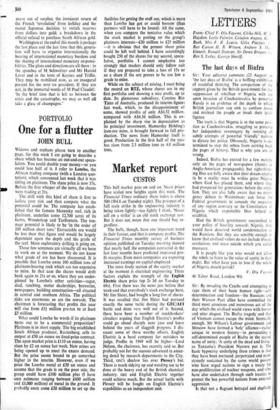Market report
CUSTOS
This bull market goes on and on. Share prices have scaled new heights again this week. The Financial Times ordinary share index is above 500 (504.8 on Tuesday night). The prospect of a full scale strike in the engineering industry is being taken lightly—too lightly I think. 'Never sell on a strike' is an old stock exchange saw. But it does not mean that one should buy re- gardless.
The bulls, though, have one important trend in their favour, and that is company profits. The Financial Times monthly survey of business opinion published on Tuesday morning showed that nearly half the companies contacted in the last four months have predicted improved pro- fit margins. Even more companies are expecting increased earnings on capital employed.
The most lively section of the equity market at the moment is electrical engineering. Three factors explain the strength of the English Electric share price (up 2s 3d on Tuesday to 69s). First there was the news just before that week-end that everybody's stock exchange hero, Mr Jim Slater, had bought a long line of shares. It was recalled that Jim Slater had pursued exactly the same tactic during the GEC/AEI battle and done very well out of it. Second, there have been a number of stockbrokers' circulars arguing that English Electric's profits could go ahead sharply next year and leave behind the years of sluggish progress. I dis- count some of these worthy efforts. English Electric is a hard company for outsiders to judge. Profits in 1969 will be higher—Lord Nelson, the chairman, has recently said so. But probably not for the reasons advanced in amaz- ing detail by research departments in the City. Third, GEC'S shadow lies over Plessey's bid. There is much tidying up and weeding out to be done at the heavy end of the British electrical industry. GEC and English Electric together could achieve much. But the actual battle with Plessey will be fought on English Electric's capabilities as an independent unit.






































 Previous page
Previous page